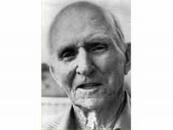Albert Barnett Facey, the youngest of seven children, spent his early years at Barkers Creek in Victoria. Following the death of his father and the re-marriage of his mother, Facey lived with his grandmother. Soon after the turn of the century, and while still a young boy, he moved to Western Australia, with his grandmother and some of his siblings, and worked as a farmhand for several years before re-locating briefly to Perth. He went on to work at a range of rural jobs around Western Australia and then joined a boxing troupe.
In 1915, Facey enlisted in the Australian Imperial Force. He was wounded during the Gallipoli campaign and discharged on health grounds in 1916. Back in Perth, he married Evelyn Mary Gibson and was employed with the tramways prior to taking up a soldier-settler block at Wickepin. The Great Depression forced him to abandon the farm and he returned to Perth and his job with the tramways. During this next period of his life he became active in the union movement and was elected president of the Western Australian Tramways, Motor Omnibus and River Ferries Employees’ Union of Workers in 1945.
Facey received no formal education as a boy, but taught himself to read and write. His autobiography, A Fortunate Life, written at the kitchen table, is dedicated to his wife’s ‘patience and understanding’. The book was originally intended as a record of Facey’s life for his family members only. However, Fremantle Arts Centre Press (later Fremantle Press) recognised the potential for a much wider appeal.
Historian J. B. Hirst, in his entry for Facey in the Australian Dictionary of Biography, says: ‘The style of the book passed beyond plainness into an elemental purity. The chapters are short, each one like a yarn. Facey’s only harsh judgment was that his mother deserted him. Critics have suggested that the book had been heavily edited, but surviving manuscripts of his several versions refute this contention.’
Manuscript copies of A Fortunate Life are held at the University of Western Australia Library. Other papers relating to Facey are located at the J. S. Battye Library, State Library of Western Australia, including the publishing agreement with Fremantle Arts Centre Press and a copy of Facey's last will and testament. A digitised version of Facey's war record is available via the National Archives of Australia, series number B2455. (In this latter document, note the spelling of Facey's second name as 'Barnet'.)
Sources include: The Oxford Companion to Australian Literature (1991, rev. ed.) and J. B. Hirst, 'Facey, Albert Barnett (Bert) (1894–1982)', Australian Dictionary of Biography (2007)
 706739479272843907.jpg
706739479272843907.jpg

